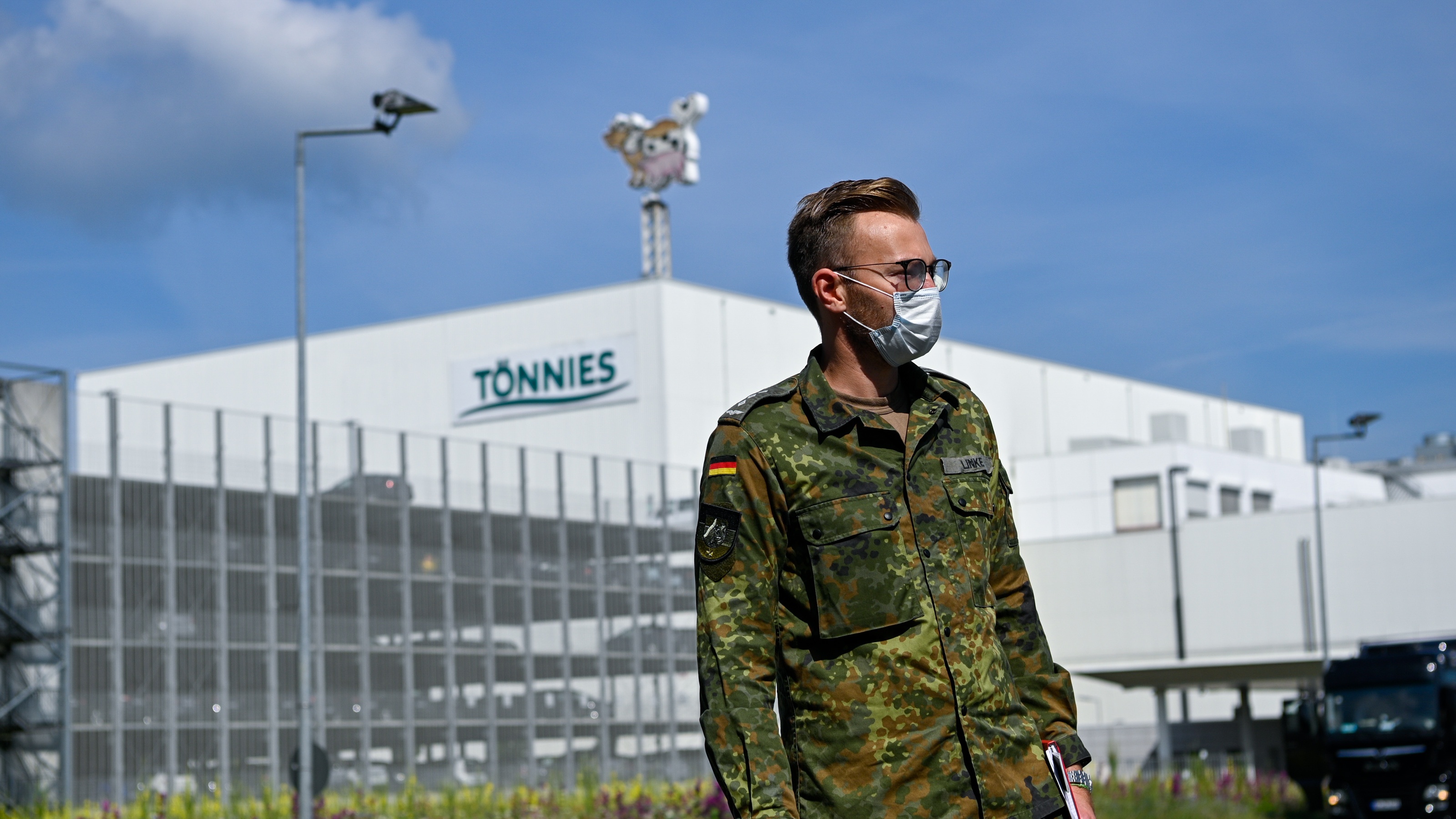Coronavirus R rate rockets in Germany after factory outbreak
Infection rate rises from 1.79 to 2.88 overnight as more than 6,000 meat plant workers are quarantined

A free daily email with the biggest news stories of the day – and the best features from TheWeek.com
You are now subscribed
Your newsletter sign-up was successful
Germany’s coronavirus reproduction rate has soared to 2.88 following a mass outbreak at a meat-processing plant, official figures show.
The R rate has climbed from 1.79 on Saturday and 1.06 on Friday, reports the country’s Robert Koch Institute for public health (RKI), which bases the numbers on a four-day average.
A reproduction rate of 2.88 “means that out of 100 people who contract the virus, another 288 others will get infected”, explains The Times, and “a rate of less than one is needed to contain the disease”.
The Week
Escape your echo chamber. Get the facts behind the news, plus analysis from multiple perspectives.

Sign up for The Week's Free Newsletters
From our morning news briefing to a weekly Good News Newsletter, get the best of The Week delivered directly to your inbox.
From our morning news briefing to a weekly Good News Newsletter, get the best of The Week delivered directly to your inbox.
The new spike comes after up to a third of the 6,500 workers at an abattoir in the northern town of Rheda-Wiedenbruck tested positive for Covid-19 last week, “prompting the closure of local schools and an urgent investigation”, Sky News reports.
Officials in North Rhine Westphalia have ordered around 6,500 employees at the abattoir, owned by meat-processing giant Toennies, and their families to go into quarantine. The Times says that it is “unclear to what extent the virus has spread outwards into the wider community”.
However, separate outbreaks have been reported in “a variety of locations” across the country, including “hospitals and nursing homes”, and in “centres for asylum seekers and refugees, among those harvesting crops and at religious and family gatherings”, adds Sky News.
In total, 191,657 cases of Covid-19 had been confirmed in Germany, with 8,897 deaths, according to latest data.
A free daily email with the biggest news stories of the day – and the best features from TheWeek.com
Germany had been easing its lockdown restrictions, as well as relaxing the rules around travel to European countries, although the authorities have advised against visiting the UK while quarantine rules are in place.
-
 The world’s most romantic hotels
The world’s most romantic hotelsThe Week Recommends Treetop hideaways, secluded villas and a woodland cabin – perfect settings for Valentine’s Day
-
 Democrats push for ICE accountability
Democrats push for ICE accountabilityFeature U.S. citizens shot and violently detained by immigration agents testify at Capitol Hill hearing
-
 The price of sporting glory
The price of sporting gloryFeature The Milan-Cortina Winter Olympics kicked off this week. Will Italy regret playing host?
-
 Epstein files topple law CEO, roil UK government
Epstein files topple law CEO, roil UK governmentSpeed Read Peter Mandelson, Britain’s former ambassador to the US, is caught up in the scandal
-
 Iran and US prepare to meet after skirmishes
Iran and US prepare to meet after skirmishesSpeed Read The incident comes amid heightened tensions in the Middle East
-
 Israel retrieves final hostage’s body from Gaza
Israel retrieves final hostage’s body from GazaSpeed Read The 24-year-old police officer was killed during the initial Hamas attack
-
 China’s Xi targets top general in growing purge
China’s Xi targets top general in growing purgeSpeed Read Zhang Youxia is being investigated over ‘grave violations’ of the law
-
 Panama and Canada are negotiating over a crucial copper mine
Panama and Canada are negotiating over a crucial copper mineIn the Spotlight Panama is set to make a final decision on the mine this summer
-
 Why Greenland’s natural resources are nearly impossible to mine
Why Greenland’s natural resources are nearly impossible to mineThe Explainer The country’s natural landscape makes the task extremely difficult
-
 Iran cuts internet as protests escalate
Iran cuts internet as protests escalateSpeed Reada Government buildings across the country have been set on fire
-
 US nabs ‘shadow’ tanker claimed by Russia
US nabs ‘shadow’ tanker claimed by RussiaSpeed Read The ship was one of two vessels seized by the US military